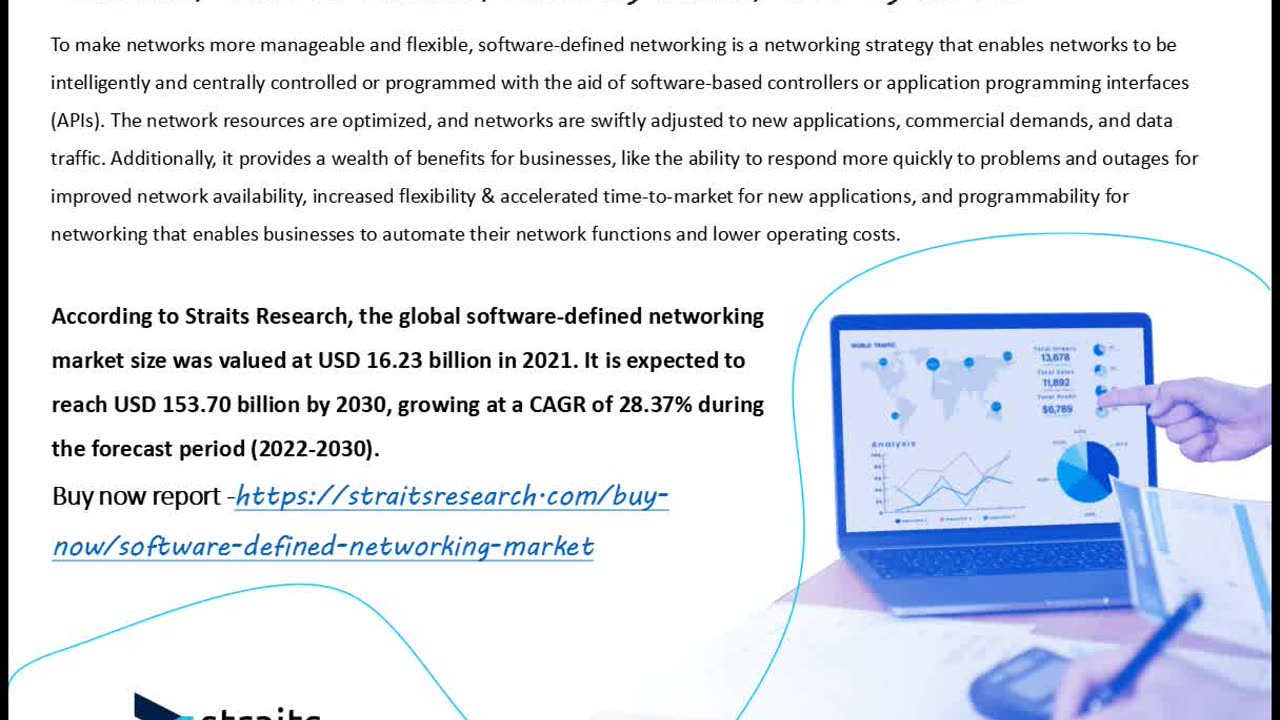Premium Only Content

Software-Defined Security Market to Reach USD 65.62 Billion by 2031
Global Software-Defined Security Market to Reach USD 65.62 Billion by 2031, Growing at a CAGR of 28.05%
The global Software-Defined Security (SDS) Market is poised for substantial growth in the coming years, with projections estimating the market size to reach USD 65.62 billion by 2031, up from USD 7.09 billion in 2022. This represents a robust compound annual growth rate (CAGR) of 28.05% over the forecast period of 2023–2031. The exponential growth of the market is driven by increasing cybersecurity concerns, the growing demand for agile and scalable security solutions, and the rapid adoption of cloud-based infrastructures across industries worldwide.
The Software-Defined Security Market encompasses a suite of software-driven technologies and solutions that are designed to provide enhanced security capabilities in highly dynamic and complex IT environments. SDS uses software to manage and control security protocols and defenses, making it easier to scale and adapt security measures as the network and systems evolve.
As organizations continue to face mounting challenges related to data breaches, ransomware attacks, and increasingly sophisticated cyber threats, the need for more flexible and automated security solutions is becoming ever more critical. Software-defined security provides a dynamic approach to network security, enabling organizations to implement, manage, and enforce security policies across hybrid cloud environments, virtualized infrastructures, and diverse endpoints.
Request a Free Sample (Free Executive Summary at Full Report Starting from USD 1850): https://straitsresearch.com/report/software-defined-security-market/request-sample
Drivers of the Software-Defined Security Market
The Software-Defined Security Market's impressive growth can be attributed to several key factors:
Increasing Cybersecurity Threats: With the rapid digital transformation across industries, organizations are facing heightened risks from cyber threats, including malware, ransomware, and phishing attacks. The need for real-time, automated, and adaptive security systems is driving the adoption of SDS solutions.
Cloud Adoption: The shift towards cloud computing and hybrid IT infrastructures is one of the major drivers of the SDS market. Cloud environments are inherently more dynamic and complex, requiring security measures that can scale quickly and flexibly. Software-defined security allows organizations to deploy robust security controls across cloud platforms, ensuring the protection of sensitive data and workloads.
Growth of Virtualization and Containerization: As businesses increasingly rely on virtualized environments and containerized applications, traditional hardware-based security measures are often insufficient. SDS offers an ideal solution by providing software-based security controls that can be easily integrated into virtual and containerized infrastructures.
Agility and Flexibility: Traditional security models, which are often rigid and hardware-centric, struggle to keep pace with the rapidly changing IT landscape. SDS enables businesses to scale their security posture quickly and effectively, offering greater flexibility and responsiveness to emerging threats.
Regulatory Compliance: Stringent regulatory requirements, particularly around data privacy and protection, are prompting organizations to seek more comprehensive, flexible security frameworks. SDS solutions help ensure compliance with regulations such as GDPR, HIPAA, and others by providing continuous monitoring and real-time threat detection.
Key Developments in the Software-Defined Security Market
The Software-Defined Security Market has witnessed several key developments and advancements that are shaping its growth trajectory:
Integration with Artificial Intelligence (AI) and Machine Learning (ML): Many SDS solutions are now leveraging AI and ML technologies to improve threat detection and response times. By utilizing intelligent algorithms, SDS solutions can analyze vast amounts of data in real time to detect anomalies and predict potential security breaches before they occur.
Partnerships and Collaborations: Major players in the cybersecurity industry are increasingly forming strategic partnerships and alliances to enhance their SDS offerings. For example, companies like Citrix and Cisco have teamed up with cloud service providers to offer integrated security solutions for hybrid cloud environments.
Cloud-native Security Solutions: As businesses continue to migrate to the cloud, the demand for cloud-native SDS solutions is on the rise. These solutions are specifically designed to operate seamlessly in cloud environments, providing scalable, agile, and automated security controls.
Zero Trust Security Models: Zero Trust is rapidly gaining popularity as a security model, with many organizations adopting it to address the challenges of securing distributed networks. SDS solutions align well with the Zero Trust framework by enabling granular access controls and continuous monitoring.
Market Segmentation with Insights-Driven Strategy Guide: https://straitsresearch.com/report/software-defined-security-market/segmentation
Segmentation Analysis of the Software-Defined Security Market
The global Software-Defined Security Market is segmented based on component, enforcement point, deployment mode, and end-user. Below is an overview of each segment:
By Component:
Solution: This includes software solutions that provide various security functions, such as firewall protection, intrusion detection, and threat intelligence, all managed through software interfaces.
Services: SDS services encompass consulting, integration, and managed services that assist businesses in implementing and optimizing software-defined security solutions. These services help organizations tailor security solutions to their unique needs and ensure their ongoing effectiveness.
By Enforcement Point:
Application and Mobile Device Security: As mobile device usage continues to rise, securing applications and mobile devices has become a top priority. SDS solutions enable organizations to enforce security policies across a wide array of endpoints.
Virtual Machines (VMs)/Server/Storage Security: SDS solutions are essential for securing virtualized environments, ensuring that data and applications hosted in virtual machines, servers, and cloud storage remain safe from external threats.
Network Security Gateways: SDS technology helps secure network traffic at the perimeter, enabling organizations to establish comprehensive security gateways that can filter traffic, detect threats, and block malicious activities.
Others: Other enforcement points include endpoint security, identity and access management, and cloud security, all of which are crucial for maintaining a secure network.
By Deployment Mode:
Cloud: Cloud-based SDS solutions offer scalability and flexibility, making them ideal for businesses operating in dynamic and hybrid IT environments. These solutions are hosted on cloud platforms and provide global accessibility.
On-premise: On-premise deployments are typically chosen by organizations that need complete control over their security infrastructure. These solutions are installed and managed internally, providing a higher level of customization and security.
By End-User:
Telecom Service Providers: Telecom companies use SDS solutions to safeguard their networks, protect user data, and ensure service availability.
Cloud Service Providers: Cloud service providers implement SDS to protect their infrastructure and deliver secure cloud services to their customers.
Enterprises: Enterprises across various industries are adopting SDS solutions to secure their internal networks, data centers, and applications from external and internal threats.
Buy Full Report (Exclusive Insights with In-Depth Data Supplement): https://straitsresearch.com/buy-now/software-defined-security-market
Top Key Players in the Software-Defined Security Market
Several key players dominate the Software-Defined Security Market, leveraging their expertise in cybersecurity, cloud services, and software development to deliver innovative solutions. Some of the leading companies include:
Citrix Systems Inc.
Cisco Systems Inc.
Fortinet Inc.
Check Point Technologies
Intel Corporation
Juniper Networks Inc.
Symantec Corporation
Catbird Networks Inc.
Palo Alto Networks Inc.
Dell Inc.
These companies are investing heavily in research and development to enhance their SDS solutions and stay ahead of evolving cyber threats.
Table of Contents for the Software-Defined Security Market Report: https://straitsresearch.com/report/software-defined-security-market/toc
About Us: Straits Research is a leading research and intelligence organization specializing in analytics, advisory services, and providing business insights through comprehensive research reports.
Contact Us:
Email:sales@straitsresearch.com
Address: 825 3rd Avenue, New York, NY, USA, 10022
Phone: +1 646 905 0080 (U.S.) | +91 8087085354 (India) | +44 203 695 0070 (U.K.)
-
 LIVE
LIVE
Barry Cunningham
1 hour agoWATCH LIVE: Kristi Noem Secretary of Homeland Security Confirmation Hearing
2,405 watching -
 30:42
30:42
BonginoReport
3 hours agoTikTok Ban BACKFIRES (Ep.121) - 01/17/2025
22.6K20 -
 LIVE
LIVE
Matt Kohrs
9 hours agoBitcoin Breakout, Stocks Rally & Payday Friday || The MK Show
1,332 watching -
 LIVE
LIVE
Vigilant News Network
15 hours agoShocking Cover-Up Exposed in Explosive Tucker Carlson Interview | The Daily Dose
1,329 watching -
 LIVE
LIVE
Game On!
13 hours agoJerry Jones to pick Deion Sanders or Kellen Moore as Dallas Cowboys' next head coach!
429 watching -
 LIVE
LIVE
Jeff Ahern
1 hour agoFriday Freak out With Jeff Ahern (What Hostages?)
325 watching -
 13:24
13:24
EvenOut
12 hours ago $2.18 earnedMATRIX AGENTS TAKE OVER REALITY!
24.5K3 -
 11:27
11:27
Reforge Gaming
13 hours agoThe GTA 6 Problem
42.8K2 -
 1:24:23
1:24:23
Kyle Rittenhouse Presents: Tactically Inappropriate
13 hours ago $2.10 earnedThe Lawman
23.8K2 -
 10:36
10:36
Clownfish TV
12 hours agoMSNBC and Rachel Maddow NEED Trump to Stay in Business...
33.6K3